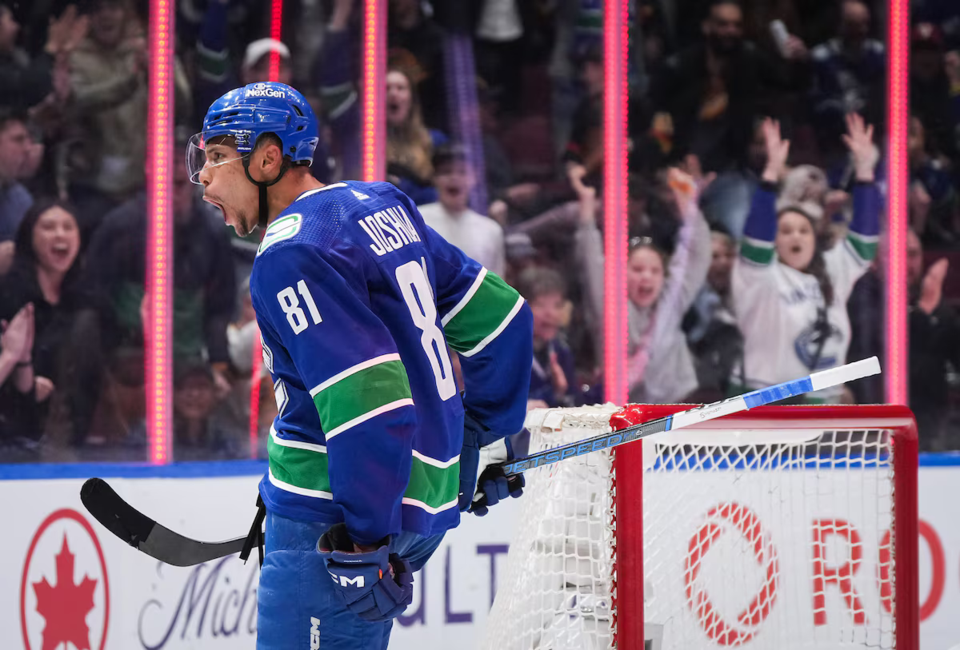Two years ago, at the age of 25, Dakota Joshua spent most of his season in the AHL. Last night, at the age of 27, he became a playoff hero for the Vancouver Canucks.
Midway through the third period, just 12 seconds after Pius Suter tied the game, Joshua took a pass from Conor Garland and snapped the puck past Juuse Saros. The goal sent the building into euphoria, an eruption of emotion that had been pent up for nearly a decade without playoff hockey in Rogers Arena and brought to a full boil by the nervous energy of entering the third period down by a goal.
It was an atmosphere that gave the Canucks players a new perspective on their own fanbase, recontextualizing the years of jerseys being thrown on the ice and boos reverberating rather than cheers. The players realized that the fans want this just as badly as they do.
It was an environment built for a player like Joshua. He’s a passionate, fiery competitor who keeps his teammates hyped up in big moments.
Of course, it helps that Joshua also seems like a player purposefully designed by the hockey gods for the playoffs. He’s big and physical but also smart and detailed in his game, with soft hands for finishing off plays around the net.
“He’s a big body, he’s tough to defend out there,” said his linemate, Elias Lindholm. “He played a really good game for us and scored some big goals. It’s fun to play with him.”
Joshua did everything for the Canucks on Sunday night. He had two goals and an assist, threw six hits, played on both sides of special teams, and did it all while hard-matched against the Predators’ top line of Filip Forsberg, Ryan O’Reilly, and Gustav Nyquist.
“He’s such a big part of this hockey team and I don’t even know if he knows how good he is, man,” said J.T. Miller. “He’s so good at a lot of things and I’m just really happy for him to get rewarded tonight.”
After the game, captain Quinn Hughes even called Joshua “Playoff D” as he handed him the game puck.
It’s a testament to how far Joshua has come in the last two seasons, not only securing his spot in an NHL lineup but becoming an indispensable part of the team. There were certainly hints that he had this potential. Two years ago in the Calder Cup Playoffs with the Springfield Thunderbirds, Joshua proved he could show up in big moments, tallying 7 goals and 15 points in 18 games.
Joshua was particularly good in the Eastern Conference Final against the Laval Rocket to help propel the Thunderbirds to the Calder Cup Final. He excelled with his linemates Mackenzie MacEachern and Will Bitten, with the team’s head coach and captain describing them in ways that mirror Joshua’s Canucks linemates, Conor Garland and Elias Lindholm.
“They’re our identity line,” said coach Drew Bannister. “That’s the way we’ve got to play and they lead our group.”
“They get the puck in the offensive zone and they’re miserable to play against,” said captain Tommy Cross. “We put them out on the ice, whether the shift after we score to kind of reset the tone or the shift after the other team scores to get the game back in our favour.”
That’s exactly the role they played Sunday night, making life miserable for the Predators’ top line and stepping on the ice for the shift after a goal, only they did more than just reset the tone.
But Joshua hasn’t just come a long way in two seasons; he’s come a long way since the start of this season. After tantalizing with his potential in his first year with the Canucks, Joshua disappointed in training camp and was even a healthy scratch early in the season. There was a sense that Joshua had more to give and he just wasn’t giving it.
“Last year, I believed in him,” said Rick Tocchet after Sunday’s game. “I thought he could score 20 goals and he probably should have if he didn’t get hurt. Dakota just doesn’t know how good he can be. He knew there was another level there, we just had to push him to find it.”
On Sunday night, he found it.
“I think he knows now what it’s going to take,” said Tocchet. “This summer, he learned from it. I think he and Garland together have really added this swagger to our team.”




